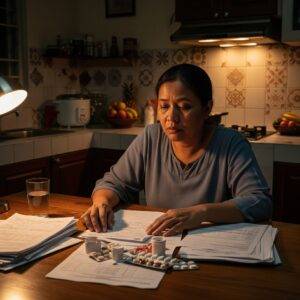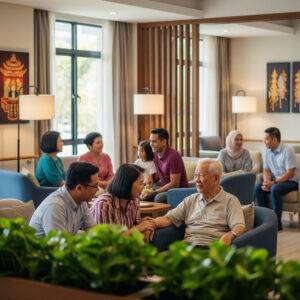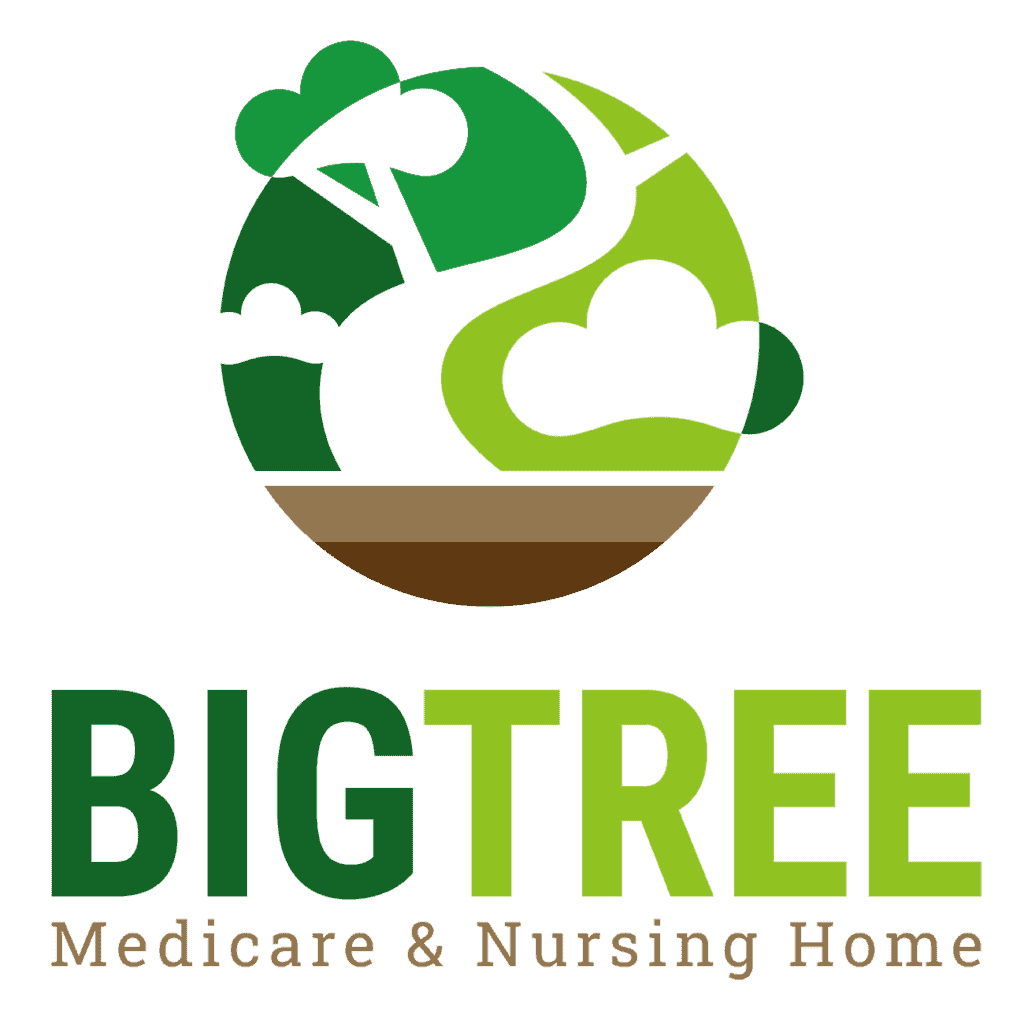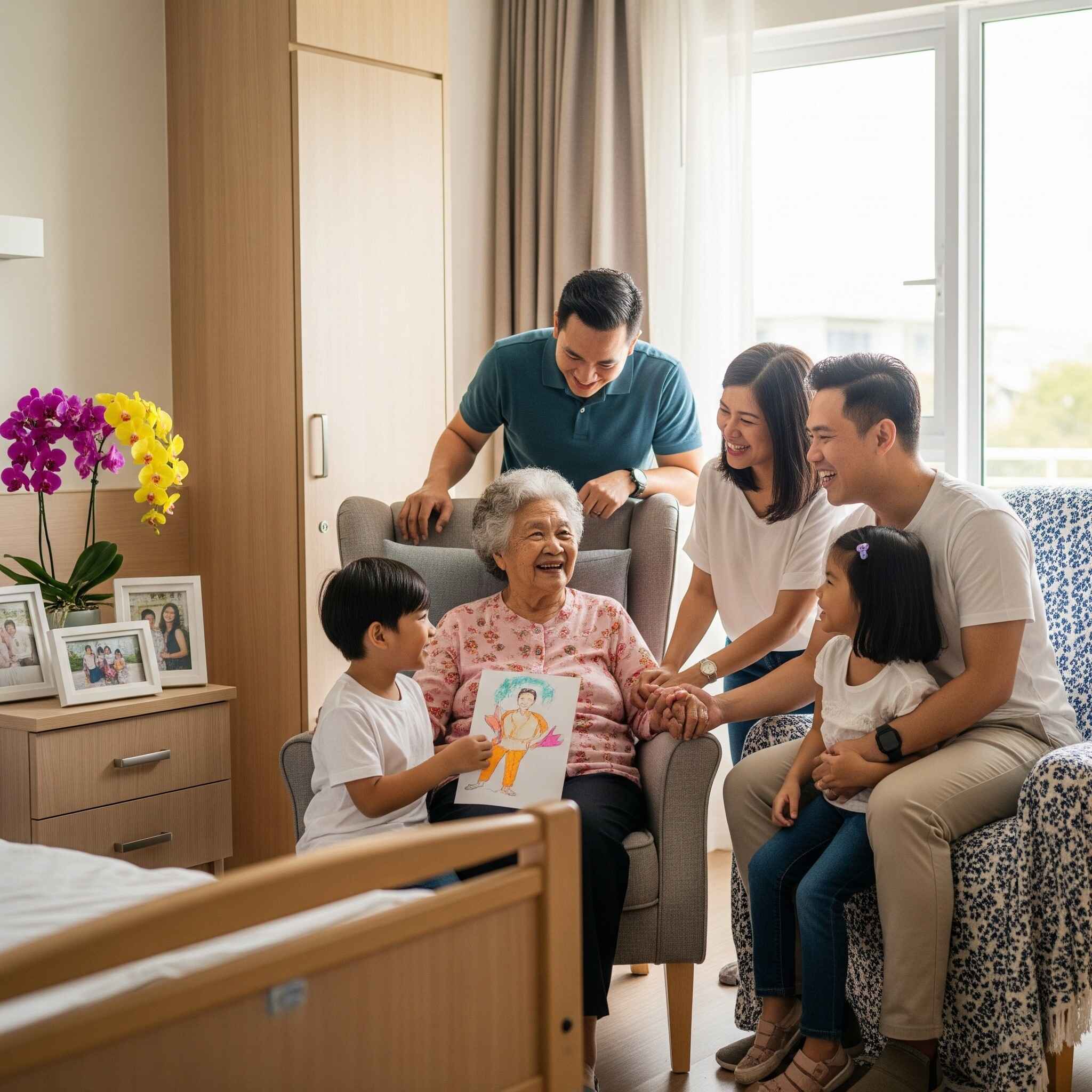BIGTREE Medicare & Nursing Home
Need help? Call Us Now : +6012 685 5103
Need help? Call Us Now : +6012 685 5103
Beyond Filial Duty: Redefining Love and Care in Modern Malaysian Families
- Home
- Beyond Filial Duty: Redefining Love and Care in Modern Malaysian Families
Uncle Leong’s decision shocked his entire extended family. At 80, this successful businessman voluntarily moved into our nursing home after transferring his businesses and properties to his children and grandchildren. “Denis,” he explained, “I didn’t want to burden my children. I want them to have peace of mind when they’re out working, knowing that their father is properly cared for. This way, when they visit me, they come with joy, not worry.”
Something profound is happening in Malaysian families today. A quiet revolution led not by the young, but by those who have spent years caring for their own elderly parents and have come to a life-changing realization:
“I don’t want my children to go through what I’m going through.”
This awakening isn’t born from a lack of love or cultural abandonment. Instead, it emerges from deep love—love that recognizes the difference between providing care and providing the right care. It’s the wisdom that comes from understanding that sometimes the most loving thing you can do is admit when professional help serves everyone better.
The Harsh Reality Behind Closed Doors

Last month, two sisters in their 50s sat across from me, their exhaustion evident despite their composed exterior. For the past several years, they had been taking turns caring for their elderly father, rotating schedules to ensure he was never alone. What they shared next revealed the hidden cost of traditional eldercare that families rarely discuss openly.
“Denis, we need to be honest,” the elder sister said quietly. “We don’t want to take care of our father anymore. We’ve grown tired of him.” She paused, the weight of cultural guilt heavy in her voice. “He’s not exactly easy to care for. He tends to bully us, criticizes everything we do, and makes us feel like nothing we do is good enough.”
Her younger sister added quietly, “We love our father, but this situation is affecting our entire families. The constant caregiving is exhausting.”
This conversation reveals a truth that Malaysian families struggle to acknowledge: love and caregiving capability aren’t always aligned. Sometimes the most loving families are the least equipped to provide the specialized, patient care that elderly individuals need—especially those whose medical conditions affect behavior and mood.
The sisters’ father wasn’t inherently difficult. His tendency to be demanding and critical likely stemmed from frustration with his own declining independence, fear of being a burden, and the complex emotions that come with aging. But family caregivers face a challenge that extends beyond training: the sheer physical and emotional demands of 24-hour caregiving.
Unlike family caregivers who must maintain constant vigilance around the clock, properly managed nursing facilities operate with three shifts of trained staff. This means fresh, alert caregivers are available at all times, rather than exhausted family members trying to manage complex needs while juggling their own responsibilities. Caregiver fatigue is real—it affects judgment, patience, and the quality of care provided, creating a cycle where everyone suffers.
When Traditional Caregiving Reaches Its Limits
Research shows that 47.4% of caregivers in Malaysia experience significant burden, with anxiety, depression, and stress being the most common psychological impacts. But these statistics don’t capture the complexity of situations where family dynamics become strained beyond repair.
The two sisters’ story illustrates a crucial insight: professional caregivers are trained to provide patient, consistent care without the emotional complications that can arise in family relationships. They understand that difficult behavior often stems from medical or psychological causes rather than personal rejection.
More importantly, professional care can actually improve family relationships by removing the stress of daily caregiving tasks. When family visits become about connection rather than obligation, when conversations focus on memories and love rather than medical management and behavioral correction, relationships often heal and strengthen.
The Courage to Choose Differently
What struck me most about the sisters was their courage to speak honestly about their limitations. This honesty—painful as it was—represented an important step toward recognizing that there might be better solutions for their entire family, including their father.
Professional eldercare doesn’t mean abandoning difficult family members. Instead, it means recognizing that trained professionals, working in shifts with adequate rest periods, can often provide more patient, consistent care while family members focus on what they do best: providing love, companionship, and emotional support during visits that become meaningful rather than burdensome.
Learning from Success Stories
Let me share several real families who found better ways to express their love through professional care partnerships:
The Freedom to Love Again: Mr. Tee and his wife approached us last June with a request that perfectly illustrates how traditional caregiving can constrain families in unexpected ways. His mother, in her 90s, was immobile but otherwise fairly well and loved to dress up and apply makeup—a small dignity that brought her joy despite her physical limitations.
Mr. Tee and his wife had been her primary caregivers for years, but they faced a dilemma: their overseas family was having a wedding, and they hadn’t traveled together as a couple since becoming caregivers. They asked if their mother could stay with us for just one week so they could attend this important family event.
What emerged from this conversation was the realization that they had unconsciously sacrificed their marriage relationship to caregiving responsibilities. That one week of respite reminded them what it felt like to focus on each other, to travel together, and to participate in extended family celebrations without constant worry.
Their mother, meanwhile, enjoyed the professional attention she received during her week with us. Our staff understood her preference for morning makeup routines and helped her maintain the grooming standards that preserved her sense of dignity and femininity. She particularly thrived leading the mahjong sessions—a very popular social activity in our nursing home that allowed her to connect with other residents and showcase her skills in a game she’d played for decades.
Quality Time Over Worry Time: Derek, whose two brothers live in Singapore, initially struggled with his mother’s mild dementia and her insistence on living alone. His constant worry about expired food in her refrigerator, forgotten medications, and safety concerns consumed his thoughts even when he was trying to focus on work or family.
When his mother moved into our facility at the beginning of our operations last July, Derek discovered something transformative: when medical and safety concerns are professionally managed, family time becomes exponentially more meaningful.
Previously, Derek’s visits to his mother were filled with anxiety—checking her refrigerator, organizing medications, assessing her safety, and correcting dangerous situations. Now, his 2-3 monthly visits focus entirely on connection: lunch and dinner outings, conversations about family news, and sharing memories.
Even more remarkably, Derek now takes his mother on extended family trips overseas, sometimes for weeks at a time, to spend time with grandchildren. This would have been impossible when she was living alone and he was consumed with daily safety concerns.
His mother had previously tried day care centers, but the constantly changing environment wasn’t suitable for someone with dementia. The stability of professional residential care provided the consistency she needed while giving Derek the peace of mind to be truly present during their time together.

The Unexpected Gift of Family Connection: Mr. and Mrs. Pang, an elderly couple in their 80s, came to our facility last October when Mrs. Pang suffered a mild stroke requiring rehabilitation while Mr. Pang needed 24-hour supervisory care despite being fairly independent.
Their daughter had been providing care for both parents, but when her mother’s condition became serious, she realized she couldn’t provide the proper nursing care required. Mrs. Pang received professional rehabilitation at our center for nine months and successfully recovered enough to return home.
But something unexpected happened during those nine months. Their son shared an insight that reveals how professional care can actually strengthen family bonds:
“My mother didn’t want to go home because she realized that family members visited her daily when she was at the facility, but not as frequently when she was at her own residence.”
Professional care had created a structure that encouraged regular family visits. When the medical burden was removed from family members, they visited more often because the visits were enjoyable rather than stressful. Mrs. Pang associated the facility with consistent family connection rather than medical isolation.
The Evolution of Filial Wisdom
These real stories illustrate a crucial evolution in how Malaysian families understand filial duty. Traditional models focused on family members providing all care directly. Modern wisdom recognizes that professional care can enhance family relationships by removing stress and creating space for meaningful connection.
Uncle Leong’s children initially resisted his decision to move to professional care, feeling it reflected poorly on their filial piety. But his wisdom became clear over time. His son recently told me, “My father taught us one final lesson about leadership—sometimes the most selfless thing you can do is take care of yourself so others can flourish.”
The families who successfully navigate this transition understand several key insights:
Professional care isn’t replacement—it’s enhancement. When medical needs are expertly managed, family time becomes more meaningful, not less.
Difficult behaviors require professional expertise. Family members who love deeply aren’t automatically equipped to manage the complex behavioral challenges that can accompany aging, illness, or cognitive decline.
Consistency benefits everyone. Professional caregivers provide consistent, patient care that family members—juggling multiple responsibilities—often cannot sustain long-term.
Family visits improve when burden decreases. When families aren’t exhausted from caregiving duties, they visit more often and with better emotional availability.
The Generational Shift: “I Don’t Want This for My Children”

The most powerful driver of change in Malaysian eldercare is current caregivers recognizing that they can break a cycle of sacrificial care that has persisted for generations. Parents are beginning to self-adjust their filial expectations as they realize it is unlikely to expect their children to fulfill traditional filial duties in strict accordance with historical models while maintaining their own wellbeing and family relationships.
The sandwich generation—those currently caring for elderly parents while raising children—are uniquely positioned to understand both the emotional importance of filial duty and its practical limitations in modern Malaysian society.
These families are asking themselves crucial questions:
- Do we want our children to experience the stress, exhaustion, and relationship strain we’re experiencing?
- Can we model a different approach that honors our parents while preserving our children’s futures?
- How can we break the cycle of sacrificial care without abandoning our cultural values?
The answers increasingly point toward professional care partnerships that allow families to focus on emotional connection while trained staff manage medical and daily care needs.
Redefining Love in Action
Research shows that older parents have higher emotional-oriented filial expectations than instrumental filial expectations—they want love, respect, and inclusion more than they want their children to perform medical or caregiving tasks.
This finding revolutionizes how we understand successful eldercare. What elderly parents value most isn’t physical caregiving tasks—it’s continued emotional connection, dignity, and inclusion in family life.
Professional eldercare, done well, actually facilitates these priorities. When medical needs are expertly managed, family interactions can focus on conversation, shared activities, memory sharing, and emotional connection—the aspects of relationships that truly matter to elderly parents.
Derek’s experience with his mother perfectly illustrates this principle. When he was managing her daily safety and medical concerns, their visits were consumed with worry and task management. Now that professionals handle those responsibilities, Derek and his mother spend their time talking, sharing meals, and creating new positive memories together.
The Practical Benefits of Professional Eldercare
Beyond the emotional and cultural benefits, professional eldercare provides practical advantages that family caregivers often cannot replicate:
Medical Expertise: Trained nurses understand medication interactions, recognize early signs of health changes, and can respond appropriately to medical emergencies.
Behavioral Management: Staff trained in eldercare understand that difficult behaviors often stem from medical, psychological, or environmental causes and can respond with patience and appropriate interventions.
Consistency: Professional caregivers provide consistent care routines that benefit elderly individuals, especially those with cognitive impairment who thrive on predictability.
Safety: Professional facilities are designed with elderly safety in mind, reducing fall risks and other safety concerns that consume family caregivers’ attention.
Social Engagement: Professional eldercare facilities provide social interaction opportunities that isolated elderly individuals often lack when depending solely on family care.
A New Vision for Malaysian Families
The future of Malaysian eldercare isn’t about choosing between family love and professional care—it’s about combining both to create the best possible outcomes for elderly individuals and their families.
This vision recognizes that:
- Love can be expressed through ensuring excellent care, not necessarily providing all care personally
- Professional caregivers can complement family emotional support with medical expertise
- Family relationships often improve when caregiving stress is reduced
- Planning for professional care is an act of wisdom and love, not cultural betrayal
- Breaking cycles of sacrificial care serves future generations without abandoning current responsibilities
The Choice Before Us
Uncle Leong’s story represents more than one man’s decision about his own care. It represents a new model of aging with wisdom and love that serves entire families across generations.
His choice to seek professional care wasn’t about receiving less love—it was about creating space for his family’s love to flourish without being constrained by medical management and daily caregiving stress. His visits with family now focus on business discussions, family updates, and sharing wisdom—the interactions that truly define their relationship.
The two sisters caring for their difficult father discovered that professional care didn’t mean they loved him less—it meant they could love him better by focusing on positive interactions rather than being consumed by caregiving challenges they weren’t trained to handle.
Mr. Tee and his wife learned that a week of professional care for his mother allowed them to reconnect as a couple and participate in extended family celebrations—strengthening their marriage, which ultimately benefits their entire family system.
Derek found that professional care for his mother allowed him to be truly present during their time together, creating new positive memories rather than being consumed with safety concerns and medical management.
Malaysian families today have opportunities that previous generations didn’t have: access to professional eldercare that honors cultural values while providing medical expertise. The choice isn’t between love and abandonment—it’s between struggling alone and accepting help that serves everyone better.
Moving Forward Together
As Malaysia approaches 2030, when 15% of our population will be over 65, the decisions families make today about eldercare will shape how future generations approach aging. We have the opportunity to model approaches that honor our cultural values while meeting modern realities.
The families who successfully navigate this evolution understand that filial duty isn’t about suffering for love—it’s about making wise choices that serve love effectively. They recognize that professional eldercare can enhance family relationships rather than threaten them.
The most loving thing we can do for our elderly parents may be ensuring they receive expert care while preserving the family relationships that define us.
Ready to explore how professional eldercare can strengthen your family bonds while ensuring expert medical care? BIGTREE Medicare & Nursing Home offers personalized consultations to help Malaysian families navigate this evolution thoughtfully.
As Malaysia’s trusted partner in comprehensive eldercare and medical services, we provide professional healthcare that meets family-centered compassion. Our Ministry of Health-licensed facility offers 24/7 skilled nursing care, advanced rehabilitation services, and family support programs designed for families ready to redefine filial duty for the modern era.
Contact BIGTREE Medicare & Nursing Home:
📞 +6012 685 5103
🌐 www.bigtree.care
📧 info@bigtree.care
📍 1, Jalan Pinggiran Kota Laksamana, 75200 Melaka
Schedule a consultation to discover how professional care and family love can work together. Because the greatest act of filial duty may be ensuring excellent care while preserving the relationships that matter most.


Leave A Comment